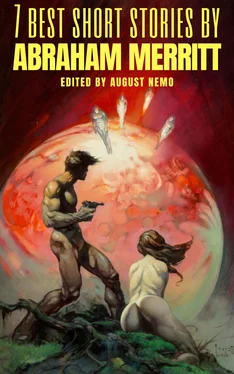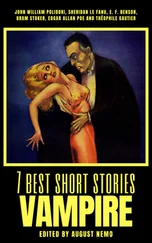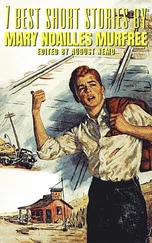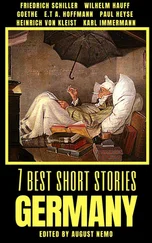I ran over to the four lying on the grass. I thought that perhaps I had had a nightmare. But they were dead. That was not the worst of it. Each man was shrunken to his bones! They looked like collapsed white balloons. There was not a drop of blood in them. They were nothing but bones wrapped around in thin skin!
Mastering myself, I went close to the idol. There was something different about it. It seemed larger—as though, the thought went through my mind, as though it had eaten. Then I saw that it was covered with tiny drops of blood that had dropped from the ends of the wings that clothed it!
I do not remember what happened afterward. I awoke on the pearling schooner Luana which had picked me up, crazed with thirst as they supposed in the boat of the Moranus .
The Last Poet And The Robots
Narodny, the Russian, sat in his laboratory. Narodny's laboratory was a full mile under earth. It was one of a hundred caverns, some small and some vast, cut out of the living rock. It was a realm of which he was sole ruler. In certain caverns garlands of small suns shone; and in others little moons waxed and waned over earth; and there was a cavern in which reigned perpetual dawn, dewy, over lily beds and violets and roses; and another in which crimson sunsets baptized in the blood of slain day dimmed and died and were born again behind the sparkling curtains of the aurora. And there was one cavern ten miles from side to side in which grew flowering trees and trees which bore fruits unknown to man for many generations. Over this great orchard one yellow sun-like orb shone, and clouds trailed veils of rain upon the trees and miniature thunder drummed at Narodny's summoning.
Narodny was a poet—the last poet. He did not write his poems in words but in colors, sounds, and visions made material. Also he was a great scientist. In his peculiar field the greatest. Thirty years before, Russia's Science Council had debated whether to grant him the leave of absence he had asked, or to destroy him. They knew him to be unorthodox. How deadly so they did not know, else after much deliberation they would not have released him. It must be remembered that of all nations, Russia then was the most mechanized; most robot-ridden.
Narodny did not hate mechanization. He was indifferent to it. Being truly intelligent he hated nothing, Also he was indifferent to the whole civilization man had developed and into which he had been born. He had no feeling of kinship to humanity. Outwardly, in body, he belonged to the species. Not so in mind. Like Loeb, a thousand years before, he considered mankind a race of crazy half-monkeys, intent upon suicide. Now and then, out of the sea of lunatic mediocrity, a wave uplifted that held for a moment a light from the sun of truth—but soon it sank back and the light was gone. Quenched in the sea of stupidity. He knew that he was one of those waves.
He had gone, and he had been lost to sight by all. In a few years he was forgotten. Fifteen years ago, unknown and under another name, he had entered America and secured rights to a thousand acres in what of old had been called Westchester. He had picked this place because investigation had revealed to him that of ten localities on this planet it was most free from danger of earthquake or similar seismic disturbance. The man who owned it had been whimsical; possibly an atavist—like Narodny, although Narodny would never have thought of himself as that. At any rate, instead of an angled house of glass such as the thirtieth century built, this man had reconstructed a rambling old stone house of the nineteenth century. Few people lived upon the open land in those days; most had withdrawn into the city-states. New York, swollen by its meals of years, was a fat belly full of mankind still many miles away. The land around the house was forest-covered.
A week after Narodny had taken this house, the trees in front of it had melted away leaving a three-acre, smooth field. It was not as though they had been cut, but as though they had been dissolved. Later that night a great airship had appeared upon this field—abruptly, as though it had blinked out of another dimension. It was rocket-shaped but noiseless. And immediately a fog had fallen upon airship and house, hiding them. Within this fog, if one could have seen, was a wide tunnel leading from the air-cylinder's door to the door of the house. And out of the airship came swathed figures, ten of them, who walked along that tunnel, were met by Narodny, and the door of the old house closed on them.
A little later they returned, Narodny with them, and out of an opened hatch of the airship rolled a small flat car on which was a mechanism of crystal cones rising around each other to a central cone some four feet high. The cones were upon a thick base of some glassy material in which was imprisoned a restless green radiance. Its rays did not penetrate that which held it, but it seemed constantly seeking, with suggestion of prodigious force, to escape. For hours the strange thick fog held. Twenty miles up in the far reaches of the stratosphere, a faintly sparkling cloud grew, like a condensation of cosmic dust. And just before dawn the rock of the hill behind the house melted away like a curtain that had covered a great tunnel. Five of the men came out of the house and went into the airship. It lifted silently from the ground, slipped into the aperture and vanished. There was a whispering sound, and when it had died away the breast of the hill was whole again. The rocks had been drawn together like a closing curtain and boulders studded it as before. That the breast was now slightly concave where before it had been convex, none would have noticed.
For two weeks the sparkling cloud was observed far up in the stratosphere, was commented upon idly, and then was seen no more. Narodny's caverns were finished.
Half of the rock from which they had been hollowed had gone with that sparkling cloud. The balance, reduced to its primal form of energy, was stored in blocks of the vitreous material that had supported the cones, and within them it moved as restlessly and always with that same suggestion of prodigious force. And it was force, unthinkably potent; from it came the energy that made the little suns and moons, and actuated the curious mechanisms that regulated pressure in the caverns, supplied the air, created the rain, and made of Narodny's realm a mile deep under earth the Paradise of poetry, of music, of color and of form which he had conceived in his brain and with the aid of those ten others had caused to be.
Now of the ten there is no need to speak further. Narodny was the Master. But three, like him, were Russians; two were Chinese; of the remaining five, three were women—one German in ancestry, one Basque, one an Eurasian; a Hindu who traced his descent from the line of Gautama; a Jew who traced his from Solomon.
All were one with Narodny in indifference to the world; each with him in his viewpoint on life; and each and all lived in his or her own Eden among the hundred caverns except when it interested them to work with each other. Time meant nothing to them. Their researches and discoveries were solely for their own uses and enjoyments. If they had given them to the outer world they would have only been ammunition for warfare either between men upon Earth or men against some other planet. Why hasten humanity's suicide? Not that they would have felt regret at the eclipse of humanity. But why trouble to expedite it? Time meant nothing to them because they could live as long as they desired—barring accident. And while there was rock in the world, Narodny could convert it into energy to maintain his Paradise—or to create others.
The old house began to crack and crumble. It fell—much more quickly than the elements could have brought about its destruction. Then trees grew among the ruins of its foundations; and the field that had been so strangely cleared was overgrown with trees. The land became a wood in a few short years; silent except for the roar of an occasional rocket passing over it and the songs of birds that had found there a sanctuary.
Читать дальше

![Коллектив авторов - Best Short Stories [С англо-русским словарем]](/books/26635/kollektiv-avtorov-best-short-stories-s-anglo-thumb.webp)










